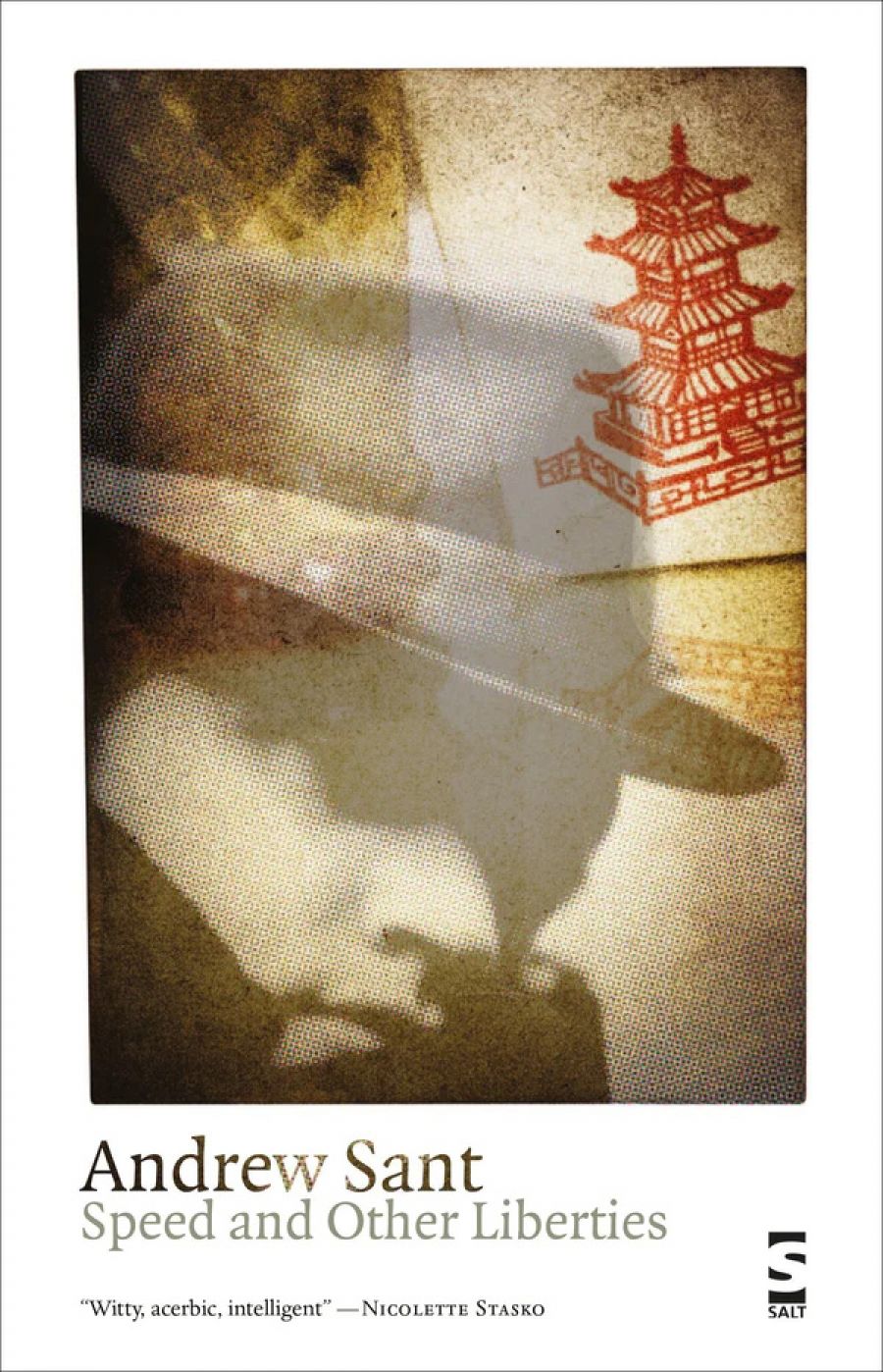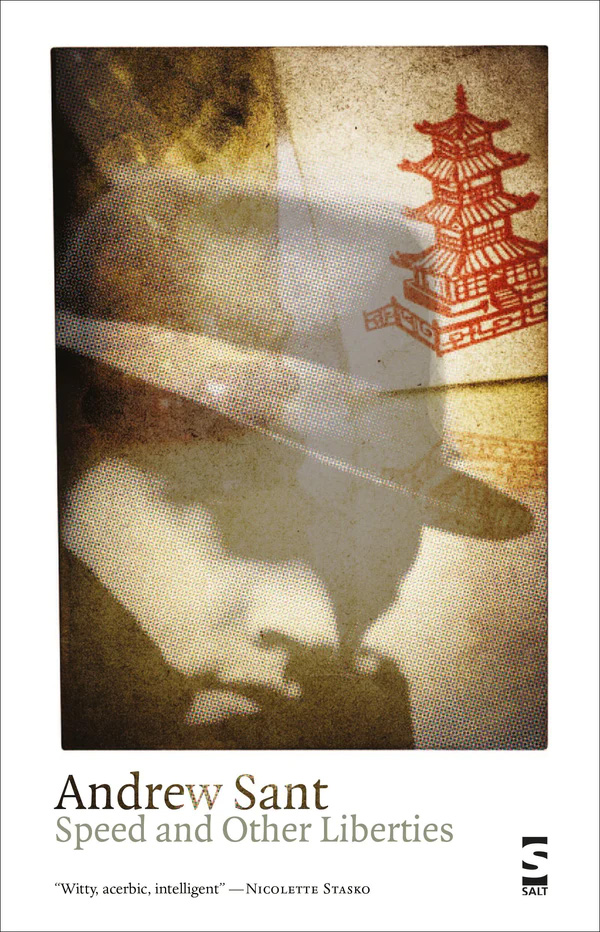
- Free Article: No
- Contents Category: Poetry
- Review Article: Yes
- Article Title: Elbow room!
- Online Only: No
- Custom Highlight Text:
Andrew Sant’s tenth book of poems marks a new, welcome direction in his work. Many of his signature flourishes are still here: intimate, detailed observations on domestic life, travel, relationships, history, and popular music. But he has added something special: strange, unpredictable associations and a willingness to break free of the constraints that kept much of his formal, lyrical earlier work too circumscribed by its subject matter. It is hard to know if Sant has made a conscious decision to confront himself stylistically, or whether it has been an organic process. Perhaps it is a combination of the two. Whatever the case, it has worked. This is the book I have been hoping Sant would write.
- Book 1 Title: Speed & Other Liberties
- Book 1 Biblio: Salt (Inbooks), $35 hb, 70 pp
- Book 1 Cover Small (400 x 600):

- Book 1 Cover (800 x 1200):

I have always been impressed by Sant’s deft, compact syntax and by his ability to be simultaneously offhand and serious. The new poems in his last book, Tremors: New and Selected Poems (2004), showed that Sant was fast approaching the kinds of risks with ideas and form that he has achieved here. It is as if the poems were leaning hard against their margins, trying to break free. I could hear them crying out, like the mushrooms in Derek Mahon’s poem ‘A Disused Shed in Co. Wexford’ – ‘Elbow room! Elbow room!’
This dramatic shift has little to do with a call for new metrics, units of breath, stanza form, line-length, or imagery. It is about attitude. It is as though Sant has written his way out of careful self-awareness into, to use the title of a John Martyn album, Grace and Danger. In this remarkable new book, we find a palpable stripping away of rigidity from substance (subject matter) to reveal risks with structure and wild association.
The bells of change ring early. In the opening poem, ‘Alpha’, where dislocation, close observation, and the nuances of that paradox are deftly explored, the
astronauts’ dreams are stranger
by far than the weightless cups
and plates lingering at 28,000 kphand
… the States
seem foamed for a shave …
This short poem could be seen as a starter-motor for what is to come.
Many poems in this collection find Sant distancing himself from what he has seen or imagined. Gone is the sense of a poet knuckling down into a tight embrace with the work, holding it in place, enforcing a sense of order. These new poems are still alive with real craft and a sparkling wit, but they have light and air blowing around inside them, and often they set off in unlikely, surprising directions, returning as commentary, leaving well-placed clues. In ‘The Morning of the Funeral’, a man is lost in domestic routine, vaguely aware of his surroundings until he looks out the window to find lemons, ‘as if some citizen has flipped a switch, / bright yellow citrus globes among / the deep perennial green’. This brings him back to a sense of conflicting order, and to the hard fact of his own self-interest on a day that belongs to paying last respects to another. It is largely these kinds of contrasts, handled lightly and seamlessly, that make this book successful.
There are five dramatic monologues in Speed & Other Liberties which introduce the ubiquitous, faceless Mr Habitat. He raves, rages, proffers social commentary, is autobiographical, likes a drink, and uses books as a form of self-protection. Sant has created an amusing, opinionated character, with an often staccato voice, but I don’t care for this bloke or his various concerns or opinions. These monologues seem too self-aware, and the voice isn’t convincing. What is fine are the half-end and internal rhymes, and the tight rhythms that give these poems a strange music. Technically, they are excellent, but that is not enough for this reader. I wanted to engage with Mr Habitat, but found myself wishing he would stop talking.
I believe the centrepiece of Speed, the long poem ‘Crime Fiction’, is Sant’s finest poem to date. Its brilliant use of (Marlowesque) detective-speak, colloquial Australian and British slang, and Sant’s ability to track down the right rhythms and music, make this poem an intriguing and disturbing masterwork. Part autobiography, part surreal investigation into mystery and grief, it finds Sant in soft-shoe mode, travelling between Australia and Britain, restless, agitated, trying to solve the puzzle of his mother’s death. Like Paul Muldoon’s long poem ‘Yarrow’, Sant’s winding, puzzling, language-loving narrative never offers neat answers. It is a boozy, local/international, inspired work where settings are identified thus:
each garage emptied of a Ford or Holden
on day release up to the smoke.and
Through the iron gates I ventured
into Bedlam’s Georgian next of kin – the breeze
frisking water off the winter trees ...
Writing of the mother’s enforced stay at the Hanwell Asylum, Sant creates a bleak picture with his odd coupling of detachment and intimacy:
... this seemed a strange refuge
for a new mother. I had the dirt on those places.
They breed foul language. She already had enoughto cope with – me, competing voices in her head, and long before
TV crims got to tranquillise
many a fine expletive. It was quiet.
‘Crime Fiction’ never loses focus or pace, and it is here that the concept of speed really takes form and function. Speed of thought, action, and time. It is the poem around which the rest of this fine collection moves.
Other poems deserving of attention and close reading are ‘Loggerheads’ (which, like ‘Crime Fiction’ is a complex, image-saturated narrative), ‘Insomnia’ (‘Insomniac birds! Companions / now sleep’s abandoned like a truce ...’) and the wonderful last poem, ‘Abundance’.
Speed & Other Liberties is an unpredictable animal. The poems work quickly on the senses, but the music does not diminish because of this immediacy. This is a collection that is ‘off its leash’, and that is to be celebrated.


Comments powered by CComment